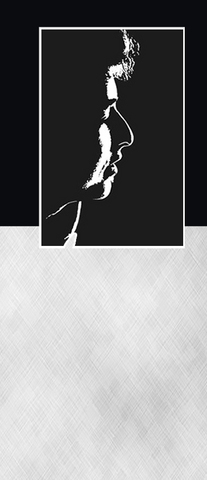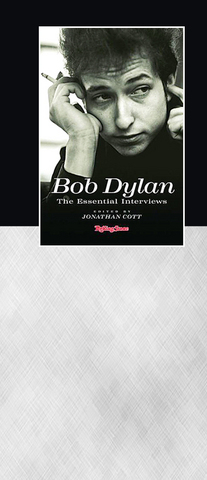Bob Dylan turned 65 on Wednesday to the strains of Forever Young, a song likely to be played by radio stations as if it were the national anthem. What did this symbolize? What were its ramifications? Will reaching that milestone have resonance for an entire generation?
This much is certain: He will hate hearing any of this stuff. "It's horrible," he told Playboy 40 years ago, on one of the countless occasions when he was asked if being a folk hero was a position of great responsibility. "I'll bet Tony Bennett doesn't have to go through this kind of thing. I wonder what Billy the Kid would have answered to such a question."
Billy the Kid didn't engage in a book's worth of verbal showdowns with the press. But Dylan has, and now those interviews have been invaluably collected. In an irresist-ible new anthology edited by Jonathan Cott, one of the original editors of Rolling Stone and arguably the most simpatico writer ever to converse with Dylan, the interview format remains eminently readable through more than 400 pages. And it yields far more than an extended conversation.

The mosaic of discussions found here (very first question: "Bob Dylan, you must be 20 years old now") is many things: biography, oral history, cultural time capsule, music lesson and psychodrama. It expands upon the mesmerizing portrait of Dylan that both his memoir, Chronicles, Volume 1, and Martin Scorsese's documentary No Direction Home have lately provided.
Arranged chronologically, these interviews vary wildly. That accounts for much of their cumulative appeal. A lot depends upon who was asking the questions and how combative or cooperative Dylan happened to be feeling. "What do you think of people who analyze your songs?" he was asked at his only televised full-length news conference, in 1965. "I welcome them -- with open arms," he replied, in much the same unwelcoming spirit on display in Don't Look Back, the 1967 documentary he subsequently renounced.
Sarcasm is an understandable response, given what he found himself up against. Here's another sampling of the same session: Does he prefer songs with messages, like Eve of Destruction? A. "Do I prefer that to what?" Q. "I don't know, but your songs are supposed to have a subtle message." A. "Subtle message???" Q. "Well, they're supposed to." A. "Where'd you hear that?" Q. "In a movie magazine." A. "Oh -- Oh God!"

Clearly, Dylan interviews are not entirely about their subject.
Questioners reveal much about themselves just by talking to him. Jann Wenner, Rolling Stone's editor, managed to inform readers that he slept stark naked and found more importance in his Dylan run-in than might have been warranted. ("It somehow seemed appropriate enough that Judy Garland's funeral coincided with the interview.")
Nat Hentoff, writing for Playboy, gives Dylan's speaking voice a suave vocabulary and syntax it doesn't have elsewhere and remarks that the singer's "tonsorial tastes are on the conservative side," compared with those of other male performers of the 1960s. "How do you feel about these far-out hair styles?" Hentoff wants to know.
Cott, whose own worshipful side emerged via Dylan ("his songs are miracles, his ways mysterious and unfathomable"), could easily have compiled a book's worth of comic absurdities. But he has sought and captured a broad spectrum of Dylan's thinking, and of others' efforts to engage him. The book finds the rising star visiting Kenyon College in 1964, in a precociously good school newspaper account written by the future film critic and screenwriter Jay Cocks. It views Dylan through the beady eyes of A. J. Weberman, who stalked Dylan, stole his garbage and treated him to the occasional political screed. "I went on & gave D a rap against Imperialism, Racism & Sexism (he didn't seem like he was listening)," Weberman declares.
Among those who best subvert Dylan to their own purposes is Sam Shepard, who turns an interview into a two-man, one-act play. It is terse, playful and then abruptly confessional, with a fade-out at the finale. ("Bob stays still, staring off right.")
Here and elsewhere Cott identifies the major sea changes in Dylan's life via conversational format, without undue commentary. The book flags in overusing the interviewers' introductions, which rehash the same biographical details and voice-of-a-generation hyperbole.
In a book that extends from 1962 to 2004 (and shows that in September 2001 the voice of his generation was as speechless as any other), Dylan's assessments of his life and work are steadily illuminating. "There's just something about my lyrics that just have a gallantry to them," he remarked in 1991. "And that might be all they have going for them. However, it's no small thing." Passages like that reaffirm an overriding certitude: Nobody can explain Dylan as well as he, when he cares to do it, can explain himself.
Which is not to say that many, many others do not try. Michael Gray, who has spent years trying to capture Dylan's lightning in a bottle, has produced Bob Dylan Encyclopedia (coming out in the middle of next month), a heavy, utterly idio-syncratic compendium. It's even up-to-date enough to make reference to The Essential Interviews and include a snarky reference to Cott. Among its many other categories: "book endorsements, unfortunate," "blues, inequality of reward in," "co-option of real music by advertising, the," "radical political activity in 1960s-70s US, the strange disappearance of" and "repertoire, Dylan's early, unsuited to commercial radio."
The many entries on individual songs and performers are arbitrary in their length. Sometimes they are Webermanesque in their fury. Under the heading "interviews and the myth of their rarity," Gray assails the claim by Cott and many others that Dylan is any sort of sphinx. According to Gray, Dylan has been averaging an interview a month for four and a half decades.
Neither book performs what would have been a vital function: providing annotations that refer back to Dylan's versions of events in Chronicles. (Ray Gooch and Chloe Kiehl, the New York couple who supposedly made the young Dylan their houseguest amid a cornucopia of wonders, remain elusive in the extreme.) The facts of Dylan's life exist in many variations, and Chronicles tried to correct the record. If he had to be pigeonholed as the voice of a generation, surely he is entitled to the last word.

In the March 9 edition of the Taipei Times a piece by Ninon Godefroy ran with the headine “The quiet, gentle rhythm of Taiwan.” It started with the line “Taiwan is a small, humble place. There is no Eiffel Tower, no pyramids — no singular attraction that draws the world’s attention.” I laughed out loud at that. This was out of no disrespect for the author or the piece, which made some interesting analogies and good points about how both Din Tai Fung’s and Taiwan Semiconductor Manufacturing Co’s (TSMC, 台積電) meticulous attention to detail and quality are not quite up to

April 21 to April 27 Hsieh Er’s (謝娥) political fortunes were rising fast after she got out of jail and joined the Chinese Nationalist Party (KMT) in December 1945. Not only did she hold key positions in various committees, she was elected the only woman on the Taipei City Council and headed to Nanjing in 1946 as the sole Taiwanese female representative to the National Constituent Assembly. With the support of first lady Soong May-ling (宋美齡), she started the Taipei Women’s Association and Taiwan Provincial Women’s Association, where she

Chinese Nationalist Party (KMT) Chairman Eric Chu (朱立倫) hatched a bold plan to charge forward and seize the initiative when he held a protest in front of the Taipei City Prosecutors’ Office. Though risky, because illegal, its success would help tackle at least six problems facing both himself and the KMT. What he did not see coming was Taipei Mayor Chiang Wan-an (將萬安) tripping him up out of the gate. In spite of Chu being the most consequential and successful KMT chairman since the early 2010s — arguably saving the party from financial ruin and restoring its electoral viability —

It is one of the more remarkable facts of Taiwan history that it was never occupied or claimed by any of the numerous kingdoms of southern China — Han or otherwise — that lay just across the water from it. None of their brilliant ministers ever discovered that Taiwan was a “core interest” of the state whose annexation was “inevitable.” As Paul Kua notes in an excellent monograph laying out how the Portuguese gave Taiwan the name “Formosa,” the first Europeans to express an interest in occupying Taiwan were the Spanish. Tonio Andrade in his seminal work, How Taiwan Became Chinese,